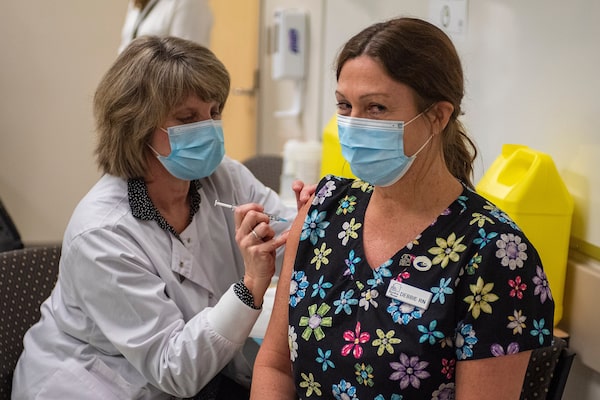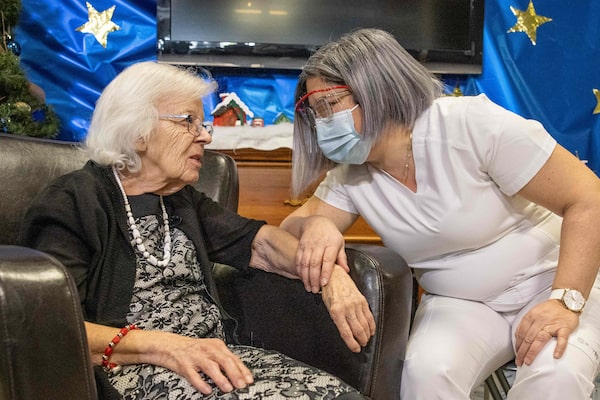A person sits in the waiting area at a mass COVID-19 vaccination clinic in Mississauga.Nathan Denette/The Canadian Press
- Rollouts by province
- National overview
Table of contents
More than 80 per cent of Canada’s population is fully vaccinated against COVID-19, but as new subvariants of Omicron spread nationwide, health officials have tried to shore up immunity with new doses, or boosters, to prevent serious illnesses. Most Canadians are already eligible for third doses, but now provinces are beginning to consider fourth shots based on new guidance from the National Advisory Committee on Immunization.
Consult our vaccine tracker to see how many doses have been administered in each province and territory and the cases counts, hospitalizations, and ICU numbers across Canada.
Vaccine rollouts by province

The first Newfoundlander injected: Public-health nurse Ellen Foley-Vick on Dec. 16.Sarah Smellie/The Canadian Press
Newfoundland and Labrador
- Official page: Check Newfoundland and Labrador’s coronavirus information page here and its booking site for vaccinations.
- The plan so far: Newfoundland and Labrador is vaccinating everyone age five and up. Third doses are available for anyone aged 18 years and older, at least 22 weeks after a second dose. Immunocompromised people can get fourth doses 22 weeks after the primary series.

One of the first three islanders vaccinated: Debbie Lawless, a registered nurse at a Charlottetown nursing home, on Dec. 16.Brian McInnis/The Canadian Press
Prince Edward Island
- Official page: Check PEI’s coronavirus information page and its guide to the vaccine rollout specifically.
- The plan so far: Bookings are open to everyone five and up. At partner pharmacies across PEI, Pfizer and Moderna are available to islanders 12 and older. Third doses are recommended for all adults at least five and a half months after the last dose.
Nova Scotia
- Official page: Check Nova Scotia’s coronavirus information page and its page for booking appointments.
- The plan so far: All Nova Scotians five and up can book appointments. Third doses are allowed for people 12 and older; the wait time between second and third doses is 168 days, about six months.
New Brunswick
- Official page: Check New Brunswick’s coronavirus information page here and its guide to the vaccine rollout specifically.
- The plan so far: New Brunswickers five and older are currently eligible for a shot. Third doses are allowed for all individuals 12 years of age and older if at least five months has passed since their second dose.

The first Quebecker injected: Gisèle Lévesque, an 89-year-old resident of a Quebec City long-term care home, on Dec. 14.PATRICK LACHANCE/MCE/AFP via Getty Images
Quebec
- Official page: Check Quebec’s coronavirus information page and its guide to the vaccine rollout specifically.
- The plan so far: Everyone five and older is eligible for vaccination, and some regions have walk-in clinics that operate depending on the supply of doses available. Parents can get their five- to 11-year-olds vaccinated either by bringing them to a walk-in clinic or scheduling an appointment through their school. Third doses are recommended three months or more after the last dose for people age 18 and older, as well as 12- to 17-year-olds who have a high risk of COVID-19 complication or live in a shelter or other restricted community facility. Fourth doses are being phased in for older age groups; the current cutoff age is 60.
Ontario
- Official page: Check Ontario’s coronavirus information page and its guide to the vaccine rollout specifically.
- The plan so far: Anyone five and older is eligible to make an appointment now via the provincial online portal. Anyone 12 and older can book booster appointments for approximately six months (168 days) after their second dose. Ontarians 60 and older are eligible to book fourth shots as of April 6.

The first Manitoban injected: Dr. Brian Penner of the internal medicine department at Winnipeg's Health Sciences Centre, on Dec. 16.John Woods/The Canadian Press/The Canadian Press
Manitoba
- Official page: Check Manitoba’s coronavirus information page and its guide to the vaccine rollout specifically.
- The plan so far: All Manitobans five and older can book through the provincial site, and anyone 18 and older can have a third shot; generally the waiting time after the second shot is six months, but people 60 and older, Indigenous adults and immunocompromised people are eligible to get it sooner.
Saskatchewan
- Official page: Check Saskatchewan’s coronavirus information page and its guide to the vaccine rollout specifically.
- The plan so far: Everyone five and up is eligible to book through an online portal. Anyone aged 12 and older is eligible for a booster dose. The interval between second and third doses for people aged 12 to 17 is five months, and three months for people aged 18 and older. People with specific health concerns are able to receive a booster dose earlier.
Alberta
- Official page: Check the Alberta government’s coronavirus information page and Alberta Health Services’ vaccination page.
- The plan so far: Everyone five and up is eligible. Third doses are available to everyone 18 and older and adolescents 12 to 17 with underlying health conditions five months after their second dose; immunocompromised people 12 and older can have fourth doses at least five months after the third.
The first British Columbian vaccinated: Nisha Yunus, a residential care aide at Providence Health Care, on Dec. 15.Jennifer Gauthier/Reuters
B.C.
- Official page: Check B.C.’s coronavirus information page and its guide to the vaccine rollout specifically.
- The plan so far: British Columbians aged five and up can register to get vaccinated any time. Third doses are for everyone 12 or older, six months after a second dose. Fourth doses began to open up to seniors in early April, starting with people over 70, Indigenous people 55 and up and extremely clinically vulnerable British Columbians.
Territories
- Official pages: Check the coronavirus information pages for Nunavut, the Northwest Territories and Yukon.
- The plan so far: In Nunavut, the Northwest Territories and Yukon, vaccines are available for anyone aged 5 and up. In Nunavut, waiting times for third doses vary by age: It’s six months for 12- to 17-year-olds: or 4 1/2 months for adults. In the Northwest Territories and the Yukon, third doses are available six months after the second.
National overview
How do the vaccines get to where I live?
The Trudeau government has bought tens of millions of doses of various vaccines and is co-ordinating with provinces, territories and First Nations to deliver them to Canadians free of charge. The vaccines go through a central agency, the National Operations Centre, where health officials and the military organize their distribution.

The rollout of COVID-19 vaccines may follow
a similar pattern but in the initial stages the
federal government will play a more active
role because of the logistical challenges
associated with vaccines that require cold
or ultracold infrastructure.
ALTA, SASK., ONT., QUE. AND N.B.
MANUFACTURER
CENTRAL DEPOT
PHARMACY WHOLESALE DISTRIBUTORS AND SELF
DISTRIBUTING CHAINS
REGIONAL DEPOT
ADMINISTRATION
SITES AND
FIRST NATIONS
PROVIDERS
PHARMACIES
B.C., N.S. and N.L.
MANUFACTURER
CENTRAL DEPOT
REGIONAL DEPOTS
ADMINISTRATION SITES AND
FIRST NATIONS PROVIDERS
Man., PEI., Yukon, NWT, Nunavut, Department of National Defence and Correctional Service Canada
MANUFACTURER
CENTRAL OR
REGIONAL DEPOTS
ADMINISTRATION SITES AND
FIRST NATIONS PROVIDERS
MURAT yükselir / the globe and mail,
source: Public Heath Agency of Canada

The rollout of COVID-19 vaccines may follow a
similar pattern but in the initial stages the federal
government will play a more active role because of
the logistical challenges associated with vaccines
that require cold or ultracold infrastructure.
ALTA, SASK., ONT., QUE. AND N.B.
MANUFACTURER
CENTRAL DEPOT
PHARMACY WHOLESALE DISTRIBUTORS AND SELF
DISTRIBUTING CHAINS
REGIONAL DEPOTS
ADMINISTRATION
SITES AND
FIRST NATIONS
PROVIDERS
PHARMACIES
B.C., N.S. and N.L.
MANUFACTURER
CENTRAL DEPOT
REGIONAL DEPOTS
ADMINISTRATION SITES AND
FIRST NATIONS PROVIDERS
Man., PEI., Yukon, NWT, Nunavut, Department of National Defence and Correctional Service Canada
MANUFACTURER
CENTRAL OR
REGIONAL DEPOTS
ADMINISTRATION SITES AND
FIRST NATIONS PROVIDERS
MURAT yükselir / the globe and mail,
source:Public Heath Agency of Canada

The rollout of COVID-19 vaccines may follow a similar pattern but
in the initial stages the federal government will play a more active role
because of the logistical challenges associated with vaccines that require
cold or ultracold infrastructure.
Alta, Sask., Ont., Que. and N.B.
B.C., N.S. and N.L.
Man., PEI., Yukon, NWT, Nunavut, Department of National Defence and Correctional Service Canada
MANUFACTURER
CENTRAL DEPOT
CENTRAL DEPOT
CENTRAL OR
REGIONAL DEPOTS
PHARMACY WHOLESALE DISTRIBUTORS AND SELF
DISTRIBUTING CHAINS
REGIONAL DEPOTS
REGIONAL DEPOTS
ADMINISTRATION
SITES AND
FIRST NATIONS
PROVIDERS
ADMINISTRATION
SITES AND
FIRST NATIONS
PROVIDERS
ADMINISTRATION
SITES AND
FIRST NATIONS
PROVIDERS
PHARMACIES
MURAT yükselir / the globe and mail, source: Public Heath Agency of Canada
Which COVID-19 vaccine will I get in Canada?
Health Canada has approved five vaccines for adults (Pfizer-BioNTech, Moderna, Oxford-AstraZeneca, Nuvaxovid and Johnson & Johnson) and one for children under 12 (Pfizer at a reduced dose). Except for Johnson & Johnson’s, which requires only one injection, they’re two-dose drugs. Nuvaxovid, the latest vaccine to be approved is the first to be protein-based. Instead of using mRNA, Nuvaxovid contains small pieces of viral proteins that have been selected for their ability to trigger immunity.
Which COVID-19 vaccine is safest?
All of the drugs approved so far are effective and safe. Not all of them work in the same way: Pfizer and Moderna are new types of mRNA-based vaccine that give the immune system a sample of the virus’s genetic material to teach it how to fight back, whereas AstraZeneca and Johnson & Johnson are more traditional viral-vector vaccines. The Nuvaxovid vaccine is protein-based.
Eligibility for the non-mRNA drugs has changed dramatically as health officials learned about a rare form of blood clotting, vaccine-induced immune thrombotic thrombocytopenia, in people who received doses. The risk of VITT is very low, regardless of age, but it’s far less likely to occur in older people. The National Advisory Committee on Immunization recommended in May that AstraZeneca and Johnson & Johnson be reserved for people over 30 who don’t want to wait for an mRNA drug, and for essential workers who can’t wait. That advice polarized doctors who maintain that Canadians should accept the first drug they’re offered, or risk getting sick or infecting others if they wait for a different one. It’s also led all provinces to stop giving AstraZeneca for first and second doses.
What other COVID-19 vaccines are in development?
Ottawa has prepurchased two other vaccine candidates and uses a “rolling submission” process so Health Canada can evaluate them before all the data is gathered:
- Medicago/GlaxoSmithKline
- Sanofi/GlaxoSmithKline
Compiled by Globe staff
With reports from The Canadian Press, Ivan Semeniuk and Kelly Grant
Our Morning Update and Evening Update newsletters are written by Globe editors, giving you a concise summary of the day’s most important headlines. Sign up today.